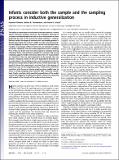| dc.contributor.author | Gweon, Hyowon | |
| dc.contributor.author | Tenenbaum, Joshua B. | |
| dc.contributor.author | Schulz, Laura E. | |
| dc.date.accessioned | 2012-06-01T16:04:34Z | |
| dc.date.available | 2012-06-01T16:04:34Z | |
| dc.date.issued | 2010-05 | |
| dc.date.submitted | 2010-03 | |
| dc.identifier.issn | 0027-8424 | |
| dc.identifier.issn | 1091-6490 | |
| dc.identifier.uri | http://hdl.handle.net/1721.1/70984 | |
| dc.description.abstract | The ability to make inductive inferences from sparse data is a critical aspect of human learning. However, the properties observed in a sample of evidence depend not only on the true extension of those properties but also on the process by which evidence is sampled. Because neither the property extension nor the sampling process is directly observable, the learner's ability to make accurate generalizations depends on what is known or can be inferred about both variables. In particular, different inferences are licensed if samples are drawn randomly from the whole population (weak sampling) than if they are drawn only from the property's extension (strong sampling). Given a few positive examples of a concept, only strong sampling supports flexible inferences about how far to generalize as a function of the size and composition of the sample. Here we present a Bayesian model of the joint dependence between observed evidence, the sampling process, and the property extension and test the model behaviorally with human infants (mean age: 15 months). Across five experiments, we show that in the absence of behavioral cues to the sampling process, infants make inferences consistent with the use of strong sampling; given explicit cues to weak or strong sampling, they constrain their inferences accordingly. Finally, consistent with quantitative predictions of the model, we provide suggestive evidence that infants’ inferences are graded with respect to the strength of the evidence they observe. | en_US |
| dc.description.sponsorship | National Science Foundation (U.S.) (Faculty Early Career Development Award) | en_US |
| dc.description.sponsorship | John Templeton Foundation (Award) | en_US |
| dc.description.sponsorship | James S. McDonnell Foundation (Collaborative Interdisciplinary Grant on Causal Reasoning) | en_US |
| dc.language.iso | en_US | |
| dc.publisher | National Academy of Sciences (U.S.) | en_US |
| dc.relation.isversionof | http://dx.doi.org/10.1073/pnas.1003095107 | en_US |
| dc.rights | Article is made available in accordance with the publisher's policy and may be subject to US copyright law. Please refer to the publisher's site for terms of use. | en_US |
| dc.source | PNAS | en_US |
| dc.title | Infants consider both the sample and the sampling process in inductive generalization | en_US |
| dc.type | Article | en_US |
| dc.identifier.citation | Gweon, H., J. B. Tenenbaum, and L. E. Schulz. “Infants Consider Both the Sample and the Sampling Process in Inductive Generalization.” Proceedings of the National Academy of Sciences 107.20 (2010): 9066–9071. Web. | en_US |
| dc.contributor.department | Massachusetts Institute of Technology. Department of Brain and Cognitive Sciences | en_US |
| dc.contributor.approver | Schulz, Laura E. | |
| dc.contributor.mitauthor | Gweon, Hyowon | |
| dc.contributor.mitauthor | Tenenbaum, Joshua B. | |
| dc.contributor.mitauthor | Schulz, Laura E. | |
| dc.relation.journal | Proceedings of the National Academy of Sciences of the United States of America | en_US |
| dc.eprint.version | Final published version | en_US |
| dc.type.uri | http://purl.org/eprint/type/JournalArticle | en_US |
| eprint.status | http://purl.org/eprint/status/PeerReviewed | en_US |
| dspace.orderedauthors | Gweon, H.; Tenenbaum, J. B.; Schulz, L. E. | en |
| dc.identifier.orcid | https://orcid.org/0000-0002-2981-8039 | |
| dc.identifier.orcid | https://orcid.org/0000-0002-1925-2035 | |
| mit.license | PUBLISHER_POLICY | en_US |
| mit.metadata.status | Complete | |
